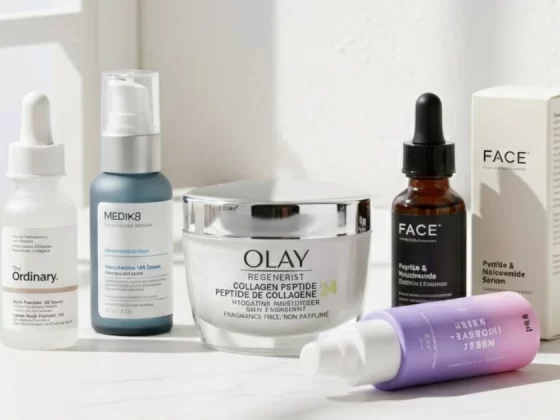 We all know stress can mess with our mood and health, but did you know it can also seriously impact your skin? Stress doesn’t just leave you feeling frazzled; it can lead to breakouts, flare-ups, and other skin issues that affect your appearance and confidence. The link between stress and skin problems is actual and often underestimated.
We all know stress can mess with our mood and health, but did you know it can also seriously impact your skin? Stress doesn’t just leave you feeling frazzled; it can lead to breakouts, flare-ups, and other skin issues that affect your appearance and confidence. The link between stress and skin problems is actual and often underestimated.
In this blog, we’ll explore how stress impacts your skin and delve into common skin issues caused by stress. We’ll also share practical tips on managing stress for healthier skin and offer advice on adopting effective skincare routines. By incorporating healthier habits and stress-management techniques, you can reduce stress’ impact on your skin and achieve a radiant, healthy glow. Let’s dive into managing stress for healthier skin and discover actionable steps to enhance overall health.
The Stress-Skin Connection
We all deal with stress occasionally, but did you know it can wreak havoc on your skin? When stressed, your body goes into overdrive, releasing hormones like cortisol that can affect your skin’s appearance and health. Stress can provoke the skin to produce more oil, become inflamed, and lead to breakouts. Understanding this connection is crucial for addressing skin problems during stressful periods. By recognizing how stress impacts your skin, you can better manage your stress and skincare routine to achieve a healthier complexion.
Common Skin Issues Caused by Stress
Stress can give rise to various skin problems, each presenting its unique set of challenges. When stress levels rise, your body releases cortisol, disrupting the balance of oil production in your skin. This imbalance often manifests as acne but can also trigger other skin conditions. Taking note of these issues can help you better address and manage them.
Acne
Stress is a significant factor in the development and exacerbation of acne. High cortisol levels boost oil production in your skin. This health issue can lead to clogged pores and more frequent breakouts. The surplus oil provides a breeding ground for bacteria, intensifying acne and causing more severe outbreaks. Stress also disrupts your skin’s inflammatory response, making existing blemishes more painful and enduring. Furthermore, stress can encourage poor habits, such as touching your face or neglecting skincare, worsening acne even more.
Eczema
If you’re dealing with eczema, stress can be a significant aggravator. Eczema, characterized by dry, itchy patches of skin, can flare up when you’re under stress due to its impact on your skin barrier and inflammation levels. Stress can weaken the skin’s defenses, making it more susceptible to irritants and allergens. It can result in more frequent and intense flare-ups, causing discomfort and distress. Managing stress effectively can help control eczema flare-ups and soothe irritated skin, contributing to overall skin health.
Psoriasis
Psoriasis, an autoimmune condition that causes rapid skin cell turnover and scaly patches, can also be triggered by stress. Stress exacerbates psoriasis by increasing inflammation, which can lead to more severe and frequent flare-ups. Its heightened inflammation accelerates the production of skin cells, leading to thicker, more visible plaques. Managing stress can help regulate the immune response and reduce the intensity of psoriasis symptoms, promoting healthier skin. Regular stress management techniques can be beneficial in keeping psoriasis under control.
Rosacea
Rosacea, which means facial redness and visible blood vessels, can become more severe during periods of stress. Stress-induced inflammation can worsen rosacea symptoms, leading to increased redness and irritation. Also, stress can trigger flushing episodes, making managing rosacea more difficult. Addressing stress through various methods can help alleviate the severity of rosacea flare-ups and improve overall skin appearance. Effective management of rosacea often relies on stress management techniques, including relaxation methods and mindfulness practices.
Hormonal Changes
Stress can significantly disrupt your hormonal balance, with far-reaching effects on your skin. When you experience stress, your body releases cortisol, a crucial hormone in the stress response. Elevated cortisol levels can increase oil production in your skin, often resulting in acne breakouts. Understanding this hormonal impact is essential for developing effective strategies to maintain healthy skin amidst stressful situations.
Weakened Immune System
When you’re stressed, your immune system becomes compromised, which affects your skin’s ability to heal and fend off infections. Its weakened immune response can leave your skin more vulnerable to various issues, making it harder to recover from acne, eczema, and other conditions. Stress reduces the production of immune cells and antibodies, impairing your body’s natural defense mechanisms. Consequently, minor skin irritations or infections can take longer to heal and may become more severe. A compromised immune system can also increase skin sensitivity and susceptibility to environmental aggressors. Regular stress management can help strengthen your immune system and enhance your skin’s resilience.
Increased Inflammation
Stress triggers inflammation throughout the body, which can manifest in your skin as redness, swelling, and exacerbated skin conditions. Increased inflammation from stress can worsen symptoms of existing skin problems and lead to new issues if not appropriately managed. Elevated cortisol levels cause the release of inflammatory cytokines, which can exacerbate conditions like rosacea, psoriasis, and eczema. This inflammation can also accelerate the degradation of collagen and elastin, resulting in early signs of aging like wrinkles and sagging skin. Effectively managing stress can help reduce systemic inflammation, promoting healthier and more resilient skin. Incorporating anti-inflammatory foods and practices into your routine can support overall skin health.
Managing Stress for Healthier Skin
Effectively managing stress is crucial for maintaining healthy skin, as stress can trigger a cascade of issues that affect your complexion. Incorporating strategies to handle stress can lead to visible improvements in your skin’s appearance and overall health. Focusing on relaxation methods, mindfulness, consistent exercise, sufficient sleep, and a nutritious diet can significantly reduce the adverse effects of stress on your complexion.
Each of these elements contributes to lowering cortisol levels, enhancing blood flow, and promoting cellular repair, all of which contribute to a healthier, more radiant complexion. Embracing these practices can help you create a holistic skincare approach that addresses internal and external factors affecting your skin.
Relaxation Techniques
Finding ways to relax can significantly improve your skin health. Methods like deep breathing, progressive muscle relaxation, and pursuing enjoyable hobbies can assist in managing stress levels. Consistently participating in activities that bring you joy and relaxation can reduce cortisol levels and enhance your skin’s health. Integrating these relaxation or stress-free techniques into your daily routine allows you to cultivate a more balanced and stress-free lifestyle. It will benefit your mental well-being and skin.
Mindfulness and Meditation
This step can significantly reduce stress and foster a healthier skin environment. These practices focus on calming the mind and being present in the moment, which can help lower stress hormones and improve your skin’s appearance. Incorporating mindfulness and meditation into your routine enables you to handle stress more effectively and cultivates a calmer internal environment that benefits your skin’s health.
Regular Exercise
Since then, this procedure has been commonly known for relieving stress and promoting skin health. Physical activity boosts endorphins, natural mood enhancers, and lowers stress levels. Moreover, regular exercise enhances blood circulation to the skin, supporting its repair and renewal. An active lifestyle can help keep stress and contribute to a healthier, more radiant complexion.
Adequate Sleep
Remember to consider the impact of a good night’s sleep. Quality sleep supports your body’s recovery processes and helps regulate stress hormones. Get 7-9 hours of restful sleep each night to help your skin repair and rejuvenate. Consistent sleep patterns can also improve overall mood and reduce stress, leading to better skin health.
Healthy Diet
A healthy meal daily allows your body to manage stress and maintain healthy skin. You can consider balancing the combinations of essential foods like fruits, vegetables, grains, and foods with lean proteins. These meals help control stress levels and improve your skin’s condition. You can also consider adding omega-3 fatty acids to your diet, which are present in fish and nuts. This nutrient is especially effective at reducing inflammation. Eating well gives your skin essential nutrients and helps you manage stress more effectively.
Skincare Tips for Stress-Related Skin Issues
Gentle Cleansing
When stress affects your skin, opt for gentle cleansers that won’t strip away essential oils or irritate your skin. Look for products labeled “gentle” or “for sensitive skin” to avoid exacerbating stress-related skin issues. A mild cleanser can help maintain your skin’s natural balance while removing dirt and impurities.
Moisturizing Regularly
Maintaining skin hydration is essential, particularly during stress-induced flare-ups. To begin your moisturizing journey, use a moisturizer that matches your skin type. If you consider this suggestion, it will help you to preserve your skin barrier and alleviate dryness and irritation. Regular moisturizing can soothe stressed skin and prevent additional issues related to dryness and sensitivity.
Avoiding Harsh Products
Harsh products can further irritate stressed skin, making existing issues worse. Avoid products with strong fragrances, alcohol, or other irritating ingredients. Opt for soothing, hypoallergenic options that are less likely to trigger or exacerbate stress-related skin problems.
Protecting Skin from the Sun
Stress can increase your skin’s sensitivity to the sun, so using sunscreen with a minimum SPF of 30, even overcast days, is essential. This popular skincare product protects your face from harmful UV rays that can worsen stress-related skin issues and accelerate signs of aging. Daily sun protection is a simple but effective way to safeguard your skin’s health.
Stress and skin health are intricately connected, and addressing one can significantly impact the other. By recognizing the impact of stress on your skin, you can take proactive measures to manage stress and your skincare routine. Implementing different strategies can help mitigate the adverse effects of stress on your skin. Consistent self-care and mindfulness improve your skin’s appearance and contribute to your overall well-being. Remember that managing stress is a gradual process that takes patience and consistency, but the benefits—healthier skin and a more balanced life—are well worth it. Integrate these practices habitually each time you wake up and enjoy the consequences or effects of a more transparent, radiant complexion.
















